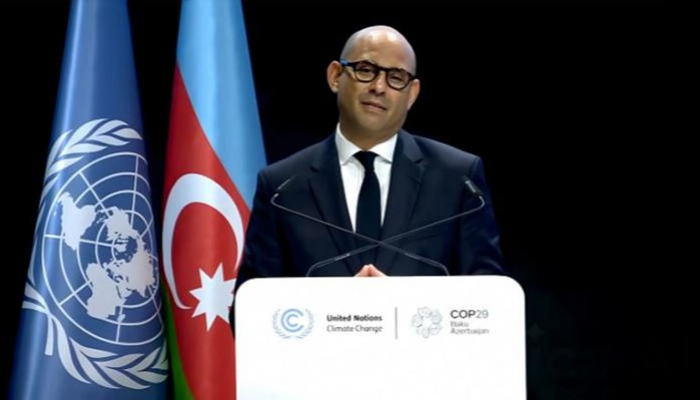Speaking at an event on National Adaptation Plans (NAPs) at COP29, Stiell underscored that NAPs are more crucial than ever as communities around the world face increasing climate vulnerabilities, AzVision.az reports.
“This year, we have seen firsthand how every bit of preparation – every policy, every plan – is the difference between life and death for millions of people,” Stiell said. “Prudence demands we plan for the worst.”
The UN official pointed to the growing challenge of climate adaptation, especially in Least Developed Countries (LDCs) and Small Island Developing States (SIDS), where resources for planning and implementation remain scarce. He stressed the high cost of inaction, noting that the financial gap for climate adaptation is widening, with costs projected to rise to $340 billion per year by 2030, and potentially as high as $565 billion by 2050.
Stiell called on the global community to urgently rethink traditional approaches to climate financing, which he described as insufficient to meet the rising demands. “We can no longer rely on small streams of finance. We need torrents of funding,” he stated, urging international financial institutions to evolve and tailor their strategies to the specific needs of the most vulnerable countries.
One key initiative launched by Stiell earlier this year was the NAPs 3.0, aimed at fostering innovative adaptation financing for LDCs and SIDS. He stressed the importance of unlocking new financing mechanisms, reducing bureaucratic barriers, and ensuring that adaptation plans are accessible to countries that need them most.
“We must explore innovative financing mechanisms, and provide the technical assistance countries need to formulate their NAPs,” Stiell emphasized. “The global financial system must meet the needs of those who are most at risk.”
Stiell also highlighted the transformational potential of adaptation investments. He argued that properly funded and scaled adaptation efforts can go beyond mitigating risks and protect communities, economies, and livelihoods. Furthermore, these investments can drive greater opportunities, equality, and prosperity, especially for those hardest hit by climate change.
The Executive Secretary’s speech stressed the urgency of action, calling on all countries to submit their National Adaptation Plans by 2025. “This is not just a timeline – it is a lifeline,” he said, framing the deadline as a crucial opportunity for nations to strengthen their resilience in the face of worsening climate impacts.
“We have the tools, the science, the ability to achieve these outcomes. The funding exists. We need to unlock and unblock it,” Stiell concluded, urging the international community to rise to the challenge of building a just and climate-resilient future for all.
As COP29 continues in Baku, the world’s attention remains focused on the need for urgent and coordinated action to address climate adaptation, with a particular emphasis on ensuring that the most vulnerable nations are not left behind.
AzVision.az
More about: Azerbaijan COP29 UN SimonStiell
















































